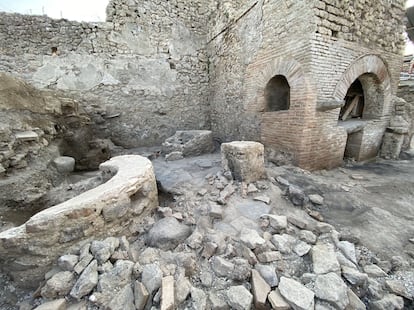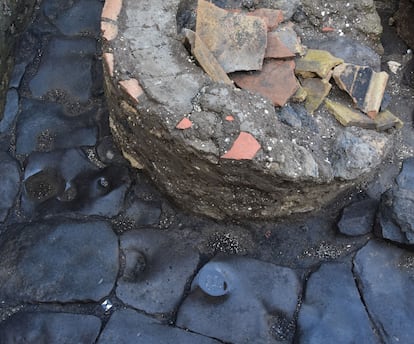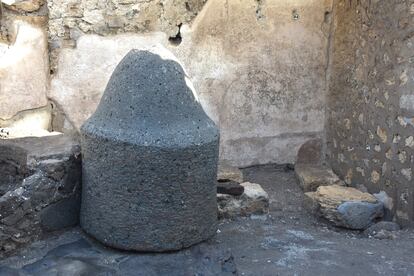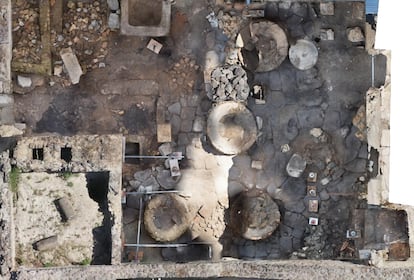In Pompeii, a bakery-prison where slaves were exploited, is discovered
New excavations have unearthed a confined space where serfs were forced to perform hard labor alongside donkeys to make bread.

The latest discovery at Pompeii shows the cruelest side of Ancient Roman society. Archaeologists excavating the site have come across a disconcerting picture that testifies to the horrendous conditions in which slaves lived two millennia ago: a bakery-prison, a narrow and unhealthy space where enslaved people lived poorly and worked to exhaustion alongside a herd of donkeys.
The tiny windows that have been found in the room, pierced by iron bars, let in a meager light and did not open to the outside, but to another room of the dwelling. Inside, enslaved men and women and animals lived, slept and ground grain to make bread together.
The donkeys had to walk in a circle for hours, both day and night, blindfolded, to move the millstone, accompanied by a person who, in addition to pushing the millstone, had to whip the animal and monitor the milling process, adding grain and taking out the flour when it was time. The pavement still preserves the notches that were made to prevent the beasts from slipping and that, at the same time, traced a kind of circular itinerary.
The management of the Pompeii Archaeological Park has explained that the brutality of the working conditions in the mills of antiquity was already documented in the work The Golden Ass, also known as the Metamorphoses by the writer Apuleius, who lived in the 2nd century AD. In this Latin novel, the popular author narrates the adventures of Lucius, transformed into an ass and sold to a miller, and describes in horrifying detail the deplorable conditions in which the mill slaves lived, “evidently based on direct knowledge of similar contexts,” as a statement points out.

Apuleius delineates the lousy existence of the slaves: “With their skin all marked with dark bruises, their backs bruised by blows, over which a ragged rag rather than covering, cast a shadow; some wore only a piece of thin cloth around their private parts, and all of them were dressed in such a way that through those rags one could see everything, their foreheads were marked with letters, their heads shaved in half and their feet chained, and they were disfigured by pallor and with their eyelids consumed by the misty darkness of that dark and smoky environment and therefore they saw very badly”. And he continues: “Like boxers fighting all sprinkled with dust, they were disgustingly covered with the white of that floury dust”.
The writer also details the state of the animals: “Decrepit mules and exhausted nags! Standing around the manger, their heads sunk in heaps of shredded straw, their necks bowed by rotting sores, their soft nostrils wrinkled by incessant coughing, their chests ulcerated by continual rubbing against the rope belt, their ribs exposed almost to the bone by endless pounding, their hooves stretched to excess by force of relentless running, and their whole hides damaged by a crust of filth.”
In Pompeii they point out that the new discovery provides a better understanding of the practical workings of the mill, which, although it was in disuse at the time of the eruption, “provides timely confirmation of the puzzling picture painted by Apuleius.”
The finding, like the most recent ones, contributes to offer an interdisciplinary reading of the ancient city and of the complex stratification of Pompeian society, where most of the citizens belonged to the lower classes. “It is a space in which one must imagine the presence of people of servile status whose freedom of movement the owner restricted. It is the most shocking face of ancient slavery, the one lacking relationships of trust and promises of emancipation, where people were reduced to the most brutal violence, an impression that is fully confirmed by the closing of the few windows with iron bars,” says the director of the Archaeological Park of Pompeii Gabriel Zuchtriegel, in a scientific article. And he reflects: “In the end, it is spaces like this that also help to understand why there were those who considered it necessary to change that world and why in the same years a member of a small religious group called Paul, later sanctified, wrote that it is better that we are all servants, douloi meaning slaves, but not of an earthly master, but of a heavenly one.

The bakery emerged during the excavation of a larger dwelling that has already yielded some surprises for archaeologists, including a fresco that appears to show a dough that looks remarkably like a modern-day pizza. The bakery is behind the wall with the fresco.
In another room of the dwelling, which contained the lararium, a kind of domestic altar, excavations uncovered a series of political inscriptions, the ancient equivalent of today’s election manifestos and posters. The texts invited people to vote for Aulus Rustius Verus, candidate for Aedile, an office in Ancient Rome that controlled, among other things, public works. Scientists believe that the house probably belonged to a supporter of the candidate, possibly one of his freedmen.
Excavations suggest that the house was in the midst of renovation when Vesuvius erupted, and that the bakery was probably not in service at the time. Although the bodies of three victims of the Vesuvius eruption have been found in one of the rooms of the facility, confirming that, despite the ongoing renovation, the house was not uninhabited.
Since excavations began in the 18th century, Pompeii, buried by an eruption of Vesuvius in 79 AD under tons of lapilli, ash and rock, which helped to preserve it, has not ceased to provide valuable data on the life and customs of its ancient inhabitants.

Sign up for our weekly newsletter to get more English-language news coverage from EL PAÍS USA Edition
Tu suscripción se está usando en otro dispositivo
¿Quieres añadir otro usuario a tu suscripción?
Si continúas leyendo en este dispositivo, no se podrá leer en el otro.
FlechaTu suscripción se está usando en otro dispositivo y solo puedes acceder a EL PAÍS desde un dispositivo a la vez.
Si quieres compartir tu cuenta, cambia tu suscripción a la modalidad Premium, así podrás añadir otro usuario. Cada uno accederá con su propia cuenta de email, lo que os permitirá personalizar vuestra experiencia en EL PAÍS.
¿Tienes una suscripción de empresa? Accede aquí para contratar más cuentas.
En el caso de no saber quién está usando tu cuenta, te recomendamos cambiar tu contraseña aquí.
Si decides continuar compartiendo tu cuenta, este mensaje se mostrará en tu dispositivo y en el de la otra persona que está usando tu cuenta de forma indefinida, afectando a tu experiencia de lectura. Puedes consultar aquí los términos y condiciones de la suscripción digital.









































